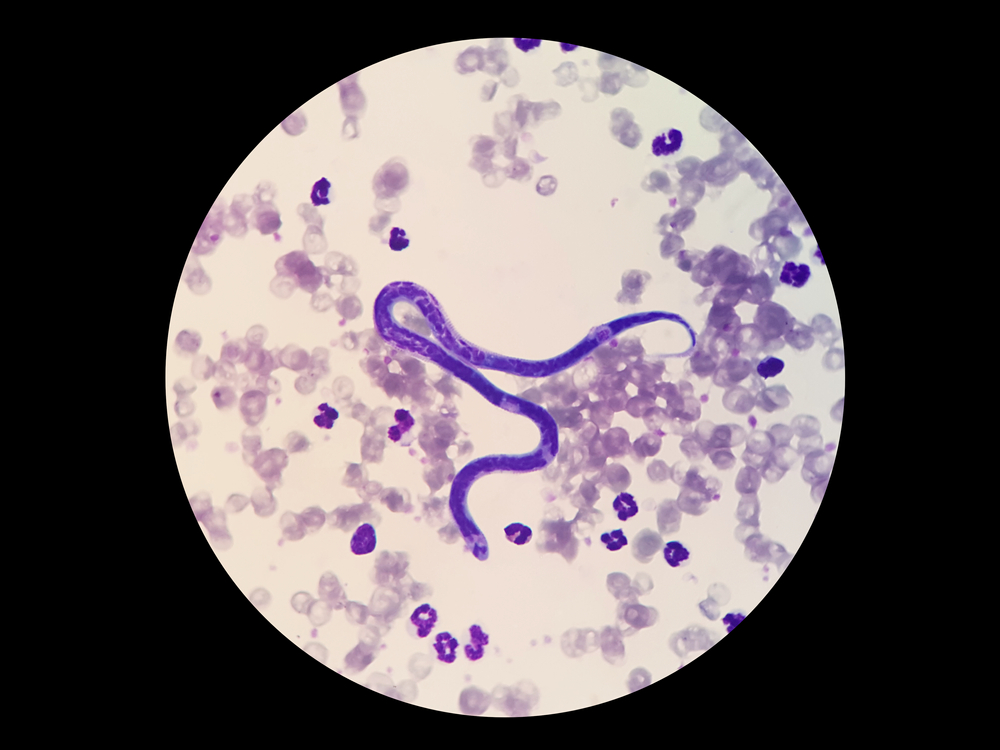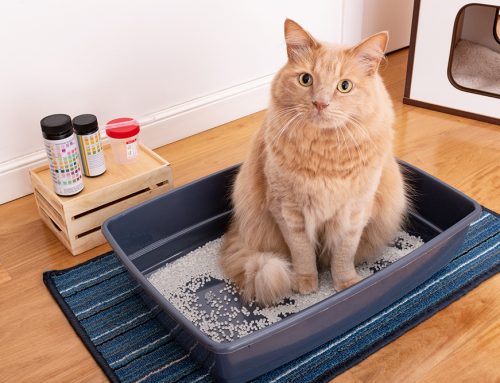With the return of warmer weather come those pesky mosquitoes. While a big ol’ itchy mosquito bite is annoying for humans, a mosquito bite can have serious—sometimes life-threatening—implications for pets. Learn how mosquitoes can transmit heartworm larvae that can cause a deadly infection for your pet, if left untreated, and how to keep your pet heartworm-free.
Mosquitoes can infect your pet with heartworms
A single mosquito bite can be deadly, if that mosquito is carrying heartworm larvae. The heartworm larvae affect your pet over time in the following sequence:
- An infected mosquito bites your pet.
- Immature heartworms enter your pet’s bloodstream.
- Approximately six months later, immature heartworms mature into adults that look like spaghetti noodles and vary in size—female worms can reach up to 12 inches long, with male worms typically around nine inches.
- The adult heartworms reproduce, impacting the pet’s heart, lungs, and pulmonary blood vessels.
- The heartworms may live inside your pet for five to seven years, and can be deadly if left untreated.
Heartworms can affect pets in all geographic locations
Heartworms can infect dogs anywhere in the world, although certain areas carry a higher risk. Risk factors include:
- Climate (i.e., temperature and humidity) — Southwest Austin’s climate is highly desirable for mosquitoes.
- The mosquito species in the area
- Presence of mosquito breeding areas
The American Heartworm Society recommends year-long heartworm preventives for all pets no matter where you live, including cold-winter regions. Some mosquito species have adapted to cold climates, and others can survive indoors during the winter months.
You can prevent your pet from heartworm infection
Heartworm disease can be deadly, but can also be prevented. By taking proactive precautions, you can avoid your pet suffering from heartworm disease.
- Heartworm preventives — Administer a prescribed heartworm preventive each month to kill any larvae that may have infected your pet during the previous month. Whether indoor or outdoor, pets should receive heartworm preventives year-round for optimal defense.
- Test for heartworm — Dogs 7 months and older should be tested annually for heartworm disease by using a simple blood test that detects adult female heartworms. Should your dog test positive for heartworms, our Oliver Animal Hospital staff will perform additional diagnostics to determine infection severity, and formulate an individualized treatment plan. Only cats suspected of heartworm disease are tested.
- Be mindful of mosquitoes — One of the best ways to prevent a heartworm infection is to mitigate your pet’s exposure to areas that mosquitoes likely inhabit. Eliminate standing water in your yard, avoid shady outdoor spots, and repair screens and windows, to prevent mosquitoes from getting inside your home.
Heartworm signs look different for cats and dogs
Cats and dogs can be infected, although cats are more resistant to heartworm disease than dogs. In dogs, the heart damage may be asymptomatic initially, but eventual signs may include:
- Coughing, or difficulty breathing
- Decreased appetite
- Lethargy, fatigue, or unwillingness to exercise
- Enlarged abdomen
- Collapse
Some cats can rid themselves of heartworms without showing any signs, but some may die suddenly without ever appearing sick. Some common heartworm signs in cats include:
- Coughing, difficulty breathing, or asthma attacks
- Vomiting, lack of appetite, or weight loss
- Collapse, or sudden death
Your pet can be treated for heartworm

Heartworm treatment is available for dogs, but unfortunately not for cats. However, treatment for dogs is far from simple. Heartworm disease is complex, takes time, and includes antibiotic and anti-inflammatory therapy to reduce side effects, deep, painful injectables to kill the worms, and exercise restriction to reduce the risk of exercise-induced side effects. During treatment, your dog must be kept safely restricted in a crate, and their activity limited to relieving themselves. If you have a particularly energetic dog, ask your veterinarian if sedation would help while their activity level is reduced. In some cases, the heartworms may need surgical removal. Because heartworm treatment is extremely uncomfortable for your dog, requires your large time commitment, and can be costly, keeping up with your dog’s monthly heartworm preventives is critical.
If your pet tests heartworm-positive, rest assured our team will always provide the highest quality treatment. But, we’d rather help you keep your pet heartworm-free. If you have questions about keeping your pet safe from heartworm disease, or need to refill their prevention medication, contact Oliver Animal Hospital.








Leave A Comment